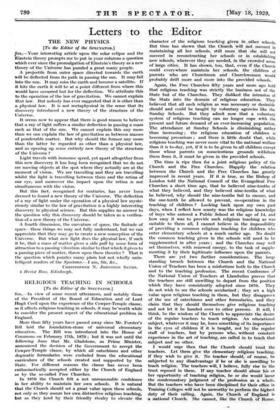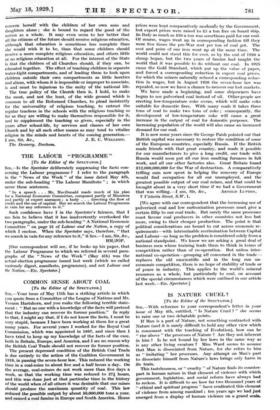RELIGIOUS TEACHING IN SCHOOLS [To the Editor of the SPECTATOR.]
SIR,—In view of some recent utterances, and notably those of the President of the Board of Education and of Lord Hugh Cecil upon the experience of the Cowper-Temple clause, as it affects religious teaching in schools, it may be'worth while to consider the present aspect of the educational problem in England.
More than fifty years have passed away since Mr. Forster's Bill laid the foundation-stone of universal elementary education. The Bill was introduced into the House of Commons on February 17th, 1870; but it was not until the following June that Mr. Gladstone, as Prime Minister, announced the decision of the Government to accept the Cowper-Temple clause, by which all catechisms and other dogmatic formularies were excluded from the educational curriculum of the schools created and supported by the State. For different reasons the clause has never been enthusiastically accepted either by the Church of England or by the so-called Free Churches.
In 1870 the Church felt a not unreasonable confidence in her ability to maintain her own schools. It is natural that the Church should set a great value upon these schools, not only as they assure her own distinctive religious teaching, but as they tend by their friendly rivalry to elevate the character of the religious teaching given in . other schools. But time has shown that the Church will not succeed in maintaining all her schools, still more that she will not succeed in reconstructing her schools or in establishing new schools, wherever they are needed, in the crowded areas of large cities. It has shown, too, that, even if the Church could everywhere maintain her schools, the children of Parents who are Churchmen and Churchwomen would probably drift more and more into the provided schools.
Again, the Free Churches fifty years and more ago held that religious teaching was strictly the business not of the State but of the Churches. They disliked the intrusion of the State into the domain of religious education. They believed that all such religion as was necessary or desirable should and could he taught by voluntary agencies like the Sunday Schools. But they admit now that a voluntary system of religious teaching can no longer cope with the present and future demand of an ever-increasing population;
The attendance at Sunday Schools is diminishing rather - - than increasing ; the religious education of children is becoming precarious ; and there is little doubt that, while religious teaching was never more vital to the national welfare than it is to-day, yet, if it is to be given to all children except those whose parents on conscientious grounds withdraw them from it, it must be given in the provided schools.
The time is ripe then for a joint religious policy of the Church and the Free Churches. Happily the relation between the Church and the Free Churches has greatly improved in recent years. If it is true, as the Bishop of London told the National Council of the Evangelical Free Churches a short time ago, that he believed nine-tenths of what they believed, and they believed nine-tenths of what he believed, why should the nine-tenths fail to ensure, and the one-tenth be allowed to prevent, co-operation in the teaching of children ? Looking back upon my own past days, when I reflect how scanty was the religious knowledge of boys who entered a Public School at the age of 14, and how easy it was to provide such religious teaching as was suitable to them all, I cannot believe in the impossibility of providing a common religious teaching for children who enter elementary schools at a much earlier age. No doubt the common teaching given in the schools will need to be supplemented in after years ; and the Churches may well set themselves, with renewed energy, to the task of supple- menting it by their legitimate influence upon the parents.
There are yet two further considerations. The long- standing breach between the Church and the National Union of Teachers has been a misfortune both to the Church and to the teaching profession. The recent Conference of the National Union of Teachers at Llandudno proves that the teachers are still unwilling to depart from the position which they have consistently adopted since 1870. They do not wish to see the schools secularized ; they set a high value upon religious teaching in them, but they disapprove of the use of catechisms and other formularies, and they claim that they should themselves give religious teaching and not let it be handed over to other persons. It will, I think, be the Wisdom of the Church to appreciate the desire of the regular teachers to teach religion. An educational subject, whatever it may be, loses something of its importance in the eyes of children if it is taught, not by the regular staff of teachers, but by persons who, without constant experience in the art of teaching, are called in to teach that subject and no other. "
I would urge then that the Church should trust the teachers. Let them give the elementary religious teaching, if they wish to give it. No teacher should, of course, be subjected to any disadvantage if he or she is unwilling to teach religion. • The teachers will, I believe, fully rise to the trust reposed in them. If any teacher should abuse his or her opportunity of teaching religion, he or she would incur the condemnatory judgment of the profession as a whole. But the teachers who have been disciplined for their office in Training Colleges will not be unworthy to perform the highest duty of their calling. Again, the Church of England is a national Church. She cannot, like the Church of Rome.
concern herself with the children of her own sons and daughters alone ; she is bound to regard the good of the nation as a whole. It may even seem to her better that all the citizens of the future should receive religious education, although that education is sometimes less complete than she would wish it to be than that some children should receive a more complete religious education, and others little or no religious education at all. For the interest of the State
is that the children of all Churches should, if they can, be educated together. The effect of teaching children in separate water-tight compartments, and of leading them to look upon children outside their own compartments as little heretics and aliens, with whom it is impossible or improper to associate, is and must be injurious to the unity of the national life. The true policy of the Church then is, I hold, to make the most, and not the least, of the wide ground which is common to all the Reformed Churches, to plead insistently for the universality of religious teaching, to entrust the regular teachers in the schools with the religious teaching so far as they are willing to make themselves responsible for it, and to supplement the teaching so given, especially in the years after school-life, by services and classes of her own Church and by all such other means as may tend to vitalize religion in the minds and hearts of the coming generation.— The Deanery, Durham.













































 Previous page
Previous page